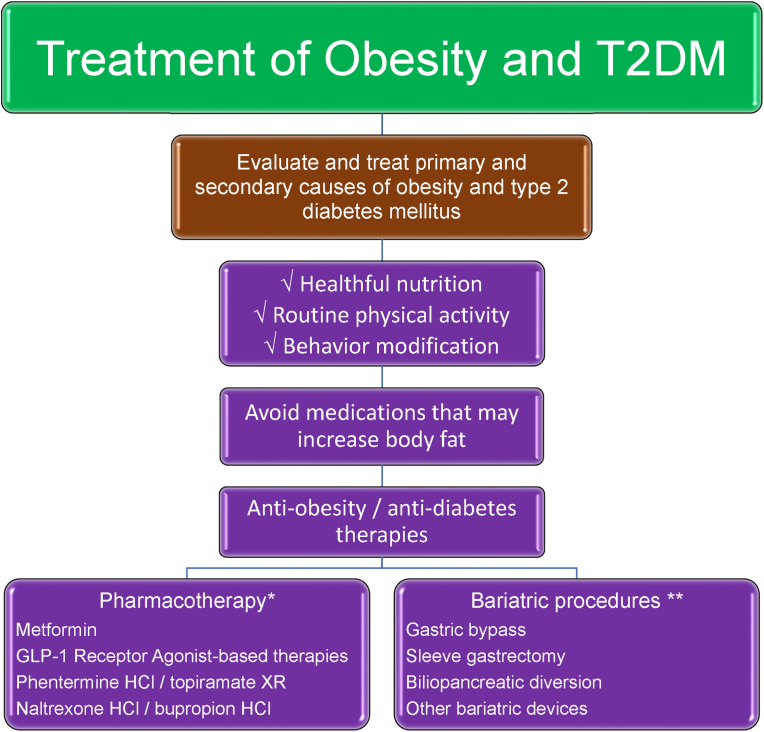Fig. 14.
Treatment of patients with obesity and type 2 diabetes mellitus (T2DM). Determining optimal therapy begins with diagnosing and treating the causes of the diseases of obesity and T2DM. Healthful nutrition, routine physical activity, and behavioral therapy are recommended to achieve and maintain ≥5% weight reduction for most patients with T2DM and pre-obesity/overweight or obesity. Additional weight reduction often results in further improvements in glycemic control and reducing cardiovascular disease (CVD) risk factors, and potentially a reduction in CVD event risk [15,[133], [134], [135]]. Factors that determine the optimal choice of anti-obesity/anti-diabetes medications in patients with pre-obesity/overweight or obesity include safety, efficacy, effects on body weight, effect on blood glucose, effect on potential diabetes remission, improvement in cardiovascular disease (CVD) risk factors, and evidence of reduced CVD outcomes [133].
∗ Most participants in the cardiovascular outcomes trials of anti-diabetes medications proven to reduce CVD risk included patients treated with baseline metformin. However, organizations such as the American Diabetes Association (ADA), have recommended metformin as an optional concurrent treatment to reduce CVD risk [136]. Metformin has limited data supporting beneficial CVD outcomes [137], and the glucose lowering effects of metformin may wane over time, with among the greatest predictors of metformin failure being higher levels of baseline hemoglobin A1c [138]. Among patients at CVD risk, the ADA gives preference to anti-diabetes therapies with proven CVD benefits, such as glucagon like peptide – 1 receptor agonist (GLP-1 RA) and sodium glucose transporter 2 inhibitors (SGLT2i) [136]. GLP- 1 RA – based anti-diabetes therapies with cardiovascular outcomes trials supporting reduction in major adverse cardiovascular events (MACE) include liraglutide, semaglutide, dulaglutide, and efpeglenatide. Tirzepatide is a GLP-1 RA and glucose-dependent insulinotropic polypeptide that improves multiple CVD risk factors and that is currently undergoing CVD outcomes trials [139,140]. SGLT2i with proven CV benefits are also recommended; however, SGLT2i promote only mild weight reduction and no SGLT2i is indicated to treat obesity [15,134,135]. Data are lacking regarding long-term, prospective, randomized, clinical efficacy and safety of phentermine monotherapy for glycemic control and CVD risk. Many patients with obesity are at high risk for CVD. T2DM is a major cardiovascular disease risk factor. Phentermine is contraindicated in patients with CVD [115].
∗∗ Metabolic/bariatric surgery [118] can improve glucose control in patients with T2DM and obesity, and may also promote remission of T2DM [133,141].

